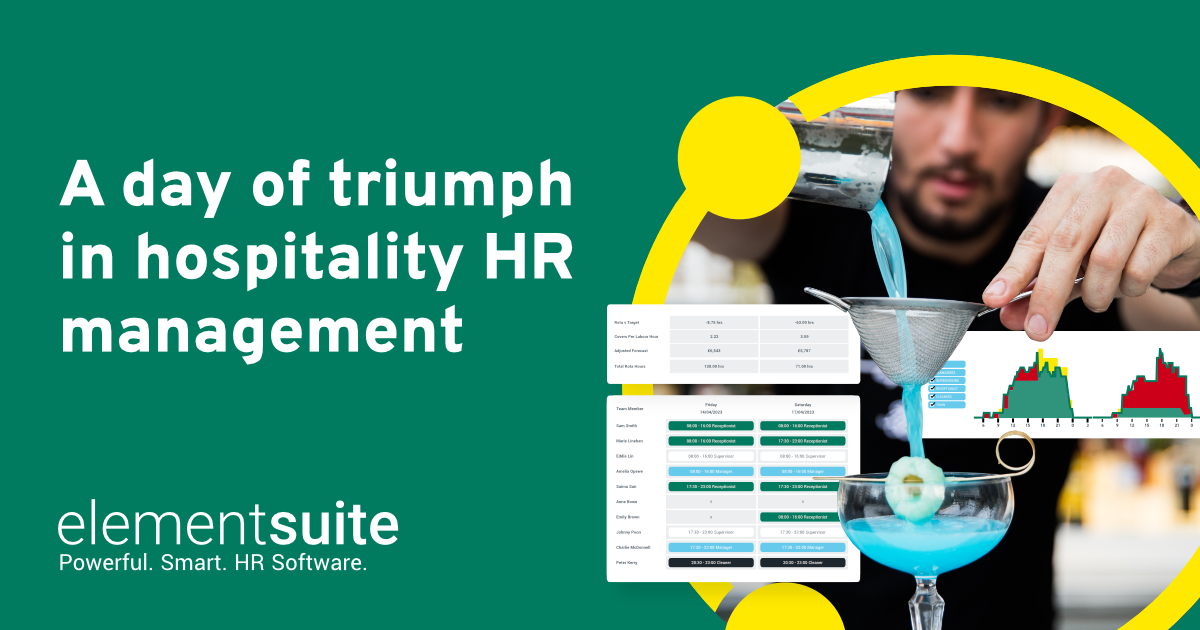Your staff are the heart and soul of your hotel’s brand. They don’t just influence the guest experience—they also reflect your hotel’s values and commitment to quality. The way they engage with guests, offer personalised recommendations, and show genuine interest in each guest’s experience can make all the difference between a hotel that thrives and one that falls short.
The importance of hiring the right hotel staff
According to PWC, 73% of consumers highlight customer experience as a critical factor in their purchasing decisions. This statistic highlights how important it is to hire hotel staff who can consistently provide top-notch service and truly represent your brand.
For experienced HR professionals, it’s not just about finding skilled people—it’s about finding those who can really enhance the guest experience and fit in with the hotel’s overall goals. The right hires can make a big difference in building guest loyalty and giving the hotel a lasting edge. A strategic approach to recruitment is essential to ensure that your team not only meets but exceeds high expectations.
Here are 10 refined strategies to help you secure the best talent for your hotel:
1. Identify the different roles and responsibilities for key staff
Having a clear understanding of the different roles and responsibilities within your hotel is crucial. Start by documenting job descriptions, key performance indicators (KPIs), and making sure they align with your hotel’s goals. An HR system can help keep all this information in one place, making it easy to access, track performance, and ensure everyone is on the same page.
In the busy world of hotel management, defining roles and responsibilities clearly is more than just a good idea—it’s key to keeping everything running smoothly. A good HR system can really help here, providing a central spot where all this important information can be stored, managed, and easily accessed by the team.
A HR system:
- Helps create and store job descriptions safely and easily
- These descriptions go beyond just listing tasks—they integrate key performance indicators (KPIs) and competencies required for each role, making it easier to assess employee performance and ensure that every role contributes meaningfully to the hotel’s goals.
- Facilitates dynamic role management
- As your hotel evolves, so too might the responsibilities and expectations of various roles. An effective HR platform allows you to update and refine job descriptions and KPIs in real-time, ensuring that your team’s responsibilities remain aligned with current operational needs and strategic initiatives.
- Enhances cross-departmental collaboration
- By providing seamless access to role definitions and performance metrics across departments, managers can better understand the interdependencies between different roles. This transparency fosters better communication and coordination, ensuring that all departments work synergistically towards common goals.
In essence, a well-integrated HR system is not just a repository of job descriptions; it’s a strategic tool that ensures clarity, consistency, and alignment across all roles within your hotel. This clarity not only supports effective performance management but also empowers your staff to understand their responsibilities and how they contribute to the hotel’s overall success.
2. Determine key positions to fill
Seasoned HR professionals recognise that proactive workforce planning is not just a best practice—it’s a strategic necessity. The hospitality industry, with its fluctuating demand patterns, seasonal variations, and changes in the nature of guest preferences, requires a meticulous approach to staffing. By regularly reviewing staffing needs in the context of current operational demands, anticipated projects, and seasonal trends, HR leaders can maintain optimal staffing levels that align with business objectives.
An advanced HR and WFM platform plays a pivotal role in this process by acting as the central hub for data-driven decision-making. With forecasting models, an HR platform can analyse a vast array of data points—from guest booking trends and event schedules to staff performance metrics and turnover rates. This integration allows HR professionals to gain a comprehensive view of the business’s workforce needs, both current and future.
With these insights, you can plan your staffing needs with much more accuracy than manual methods allow. For instance, if your hotel gets busier during the holiday season, your HR platform can help you see in advance where you might need more front-of-house staff, housekeeping, or kitchen help. It can also spot any areas where you might have too many people or where skills are lacking, so you can easily decide whether to shuffle resources, set up some training, or hire new team members.
Ultimately, an HR platform enables you to stay ahead of the curve, ensuring that your hotel is always staffed with the right people in the right positions at the right time. This not only optimises labour costs but also supports the delivery of exceptional guest experiences, reinforcing your hotel’s reputation and driving long-term success.
Learn more about why Travelodge chose elementsuite to help forecast staffing needs across 580 UK hotels
3. Prioritise service excellence
Service delivery staff are the face of your hotel, and their role goes far beyond just getting the job done—they’re key to creating the kind of guest experiences that keep people coming back. A good HR system can really help here by not only keeping track of how everyone’s doing but also giving you insights into each person’s strengths and where they might need a little extra support. By monitoring performance, the system makes it easier to spot those team members who consistently show great attentiveness, efficiency, and a warm, genuine approach to hospitality.
Past performance data ensures that, when hiring, you’re not only assessing technical capabilities but also the soft skills that are essential for delivering exceptional guest experiences. By integrating these insights into your hiring process, you can make more informed decisions, ensuring that your service delivery staff are not only capable but also aligned with your hotel’s commitment to excellence.
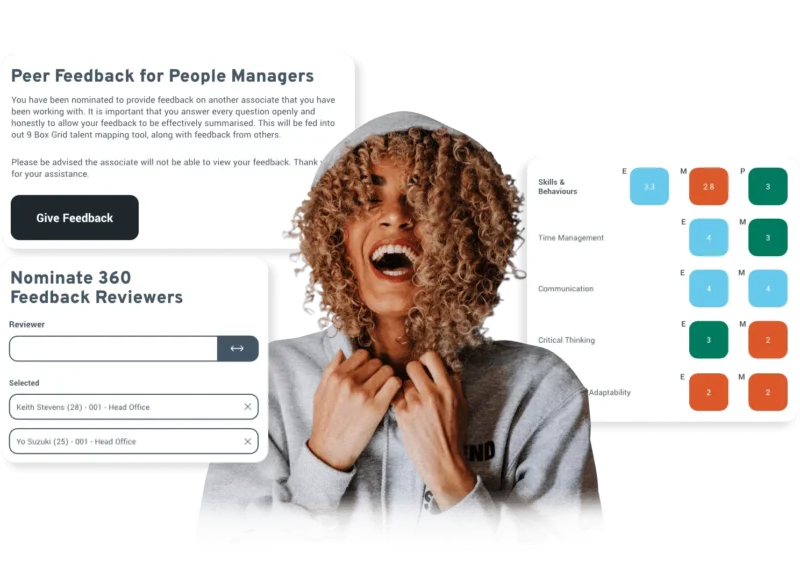
4. Understand job descriptions
Job descriptions are more than just a list of duties—they are a strategic tool for attracting the right talent. Ensure that your job descriptions are a true reflection of the role’s requirements and are crafted in a manner that resonates with your target candidates. You can leverage AI tools like ELLA to refine these descriptions, ensuring they are inclusive, unbiased, and aligned with your hotel’s culture and values.
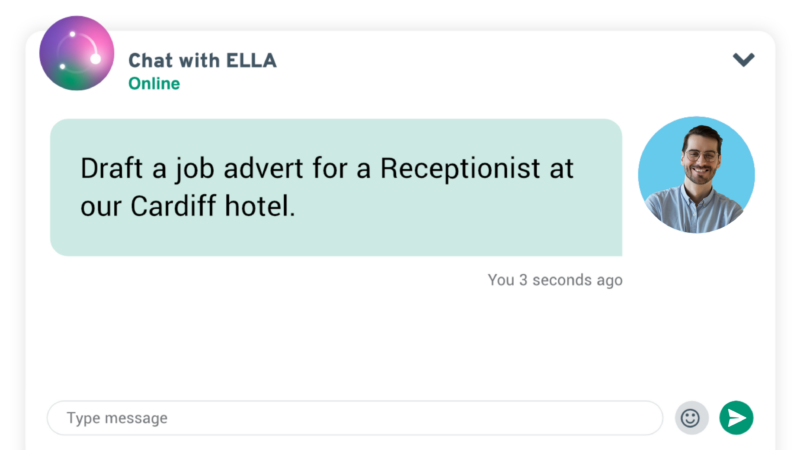
5. Define the ideal candidate for each position
To find the right person for each role, start by looking at what makes your top performers shine. With the help of advanced HR analytics, you can dig into their skills, behaviours, and successes to see what really sets them apart. This data-driven approach lets you build a candidate profile that’s perfectly matched to your hotel’s unique needs, making your recruitment process more focused and effective. By knowing exactly what you’re looking for, you’ll have a much better chance of finding candidates who are a great fit right from the start.
6. Ask the right questions at the interview
Interviews are a key part of the hiring process. Instead of just sticking to the usual technical questions, try mixing in some behavioural and situational ones. These types of questions can give you a better sense of how a candidate might handle real-life situations in your hotel’s unique environment and whether they have what it takes to really succeed. Utilise AI tools like ELLA to generate bespoke interview questions that are tailored to the specific role and informed by data-driven insights.
7. Check necessary qualifications and experience
It’s important to spot candidates with the right qualifications in hospitality, but the number of applications you get can be pretty overwhelming. That’s where a good HR system really comes in handy.
A sophisticated HR system plays a crucial role in enhancing the candidate experience and improving overall recruitment efficiency. In today’s competitive job market, top candidates expect a transparent and efficient application process. A system that allows candidates to track their application status in real time not only meets these expectations but also enhances your employer brand by demonstrating your commitment to a professional and organised hiring process.
For HR administrators, being able to track and manage applications through a central platform is really valuable. It makes the recruitment process smoother by allowing you to easily monitor, compare, and evaluate applications at different stages. Plus, with everything in one place, it’s easier to keep candidates in the loop and engaged throughout the hiring journey.
Integrating this tracking feature with your HR platform gives you a clear view of the entire recruitment process. It also helps everyone stay on the same page, from department heads to hiring managers, making sure that the process runs smoothly and efficiently. On top of that, it helps you stay compliant with data protection rules, ensuring that candidate information is securely managed and only accessible to those who need it.
8. Make your application process easy
In today’s fast-paced digital world, an efficient and user-friendly application process is non-negotiable. Simplify your application forms, ensure they are mobile-optimised, and provide real-time updates on application status. Ensure your Recruitment platform is fully integrated with your HR platform, allowing for streamlined processing, tracking, and management of applications across all platforms.
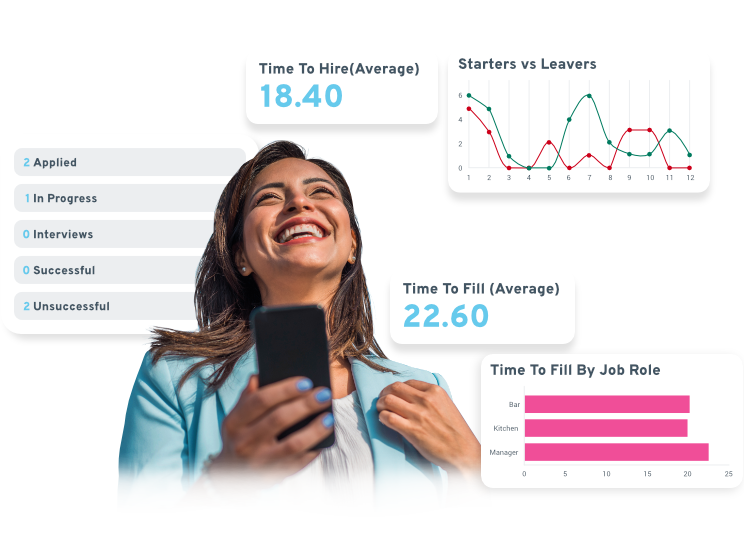
9. Evaluate soft skills in addition to technical skills
While technical skills are the foundation of a candidate’s abilities, in the hospitality industry, it’s often the soft skills that set an exceptional employee apart from a good one. Communication, adaptability, and teamwork aren’t just nice to have—they’re essential for creating memorable guest experiences and keeping your team running smoothly.
To really get a sense of these important qualities, it’s worth going beyond the usual interview questions. Using tools like behavioural assessments and psychometric tests can give you a deeper understanding of how a candidate might handle the unique challenges of working in hospitality. These tools can offer insights into their problem-solving skills, emotional intelligence, and ability to adapt—traits that are crucial in a fast-paced, guest-focused environment.
It’s also helpful to tailor your interview questions to reflect the real-world scenarios your staff might face. Instead of asking general questions about teamwork, try presenting situations that mimic the unpredictable nature of hotel work, like managing a sudden rush of guests or handling a tough complaint. This way, you’ll see how candidates apply their skills in context and get a better idea of how they might fit into your team and culture.
Don’t forget the value of thorough references from previous employers. These can provide valuable insights into whether a candidate has the interpersonal skills needed to succeed in your specific environment.
Finally, consider combining these soft skill assessments with your HR platform to create a well-rounded candidate profile. By bringing together psychometric data, interview responses, and references, you’ll have a clearer picture of whether a candidate not only has the technical know-how but also the right fit for your hotel’s culture. This approach helps you make more informed decisions and ensures you’re hiring people who will thrive and contribute positively to the guest experience.
10. Nail the onboarding and training processes
Once you’ve found the ideal candidate, it’s time to focus on onboarding them in a way that helps them smoothly integrate into your team. With the hospitality industry’s high turnover rates, it’s important to get new hires engaged right away by giving them access to your HR platform, onboarding materials, and a clear introduction to your hotel’s culture and procedures.
A good HR system can make this whole process much easier. It can automate and streamline onboarding by providing new employees with a checklist that ensures they complete all their training and orientation on time.
Plus, an HR platform can make it simple to distribute important documents like contracts for e-signing, employee handbooks, training schedules, and compliance policies. Everything is stored in one central place, saving time and preventing double-data entry. By using a robust HR system, you can make sure your onboarding process is not only efficient but also set up to help new hires feel welcome and stay with your team for the long haul.
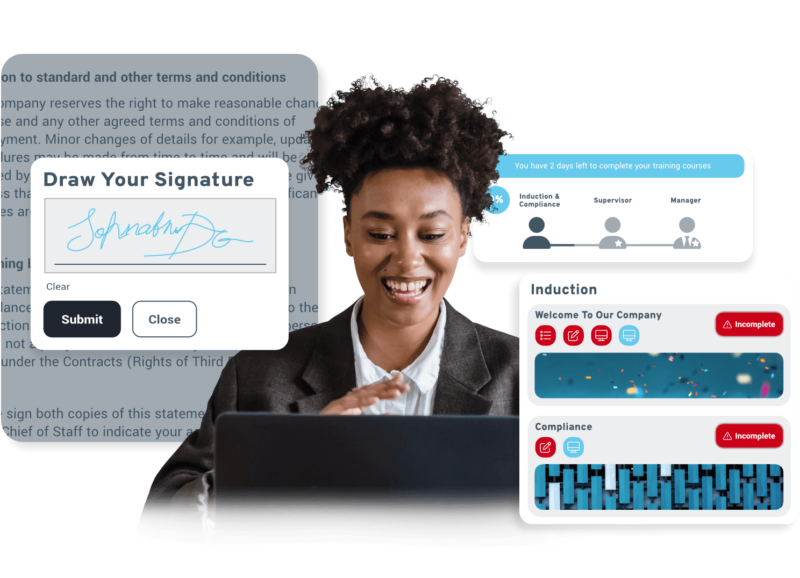
Continuous improvement through feedback
Getting feedback from new employees during the onboarding process is really important for improving your recruitment strategies. This feedback helps you spot any gaps and areas where things could be better, making sure your hiring process keeps evolving and stays in tune with the changing needs of the hospitality industry.
Conclusion
Hiring for a hotel is about far more than just filling positions—it’s about securing talent that will drive your hotel’s success and embody its values. With elementsuite, you can elevate your recruitment process through technology-driven insights, ensuring that you consistently identify, attract, and onboard the best candidates. Embrace this approach to cultivate a motivated, high-performing workforce that sets your hotel apart from the competition.


